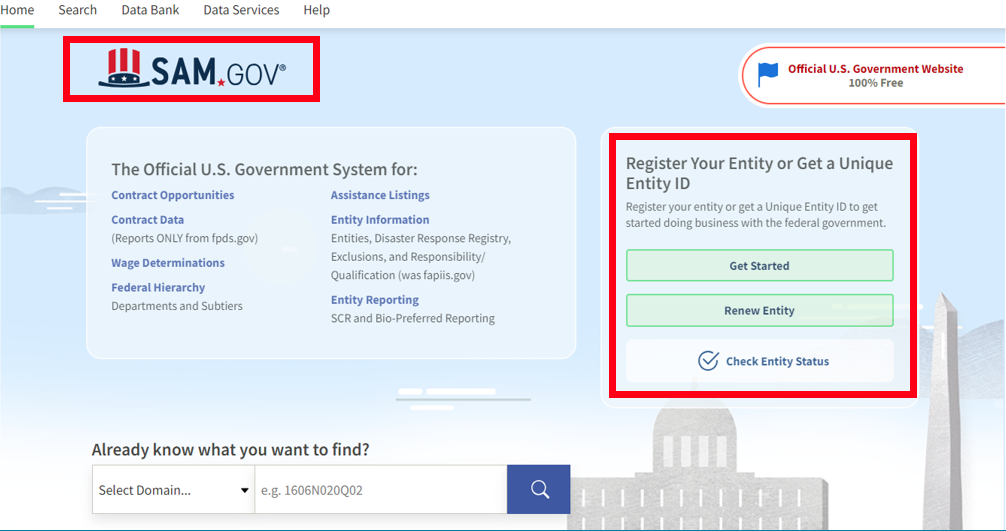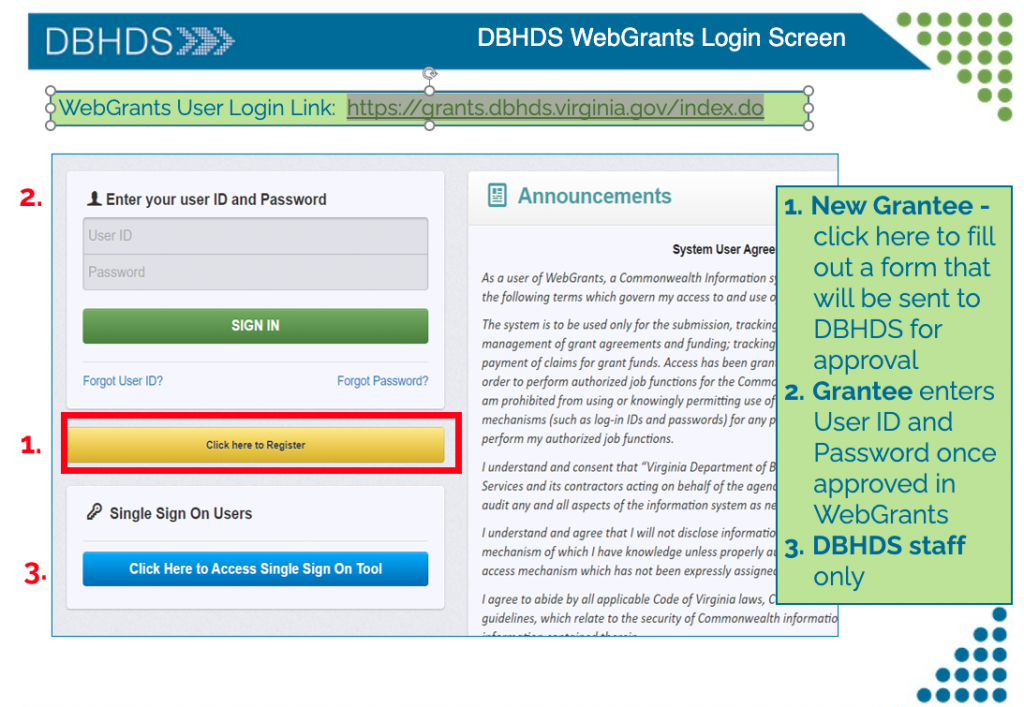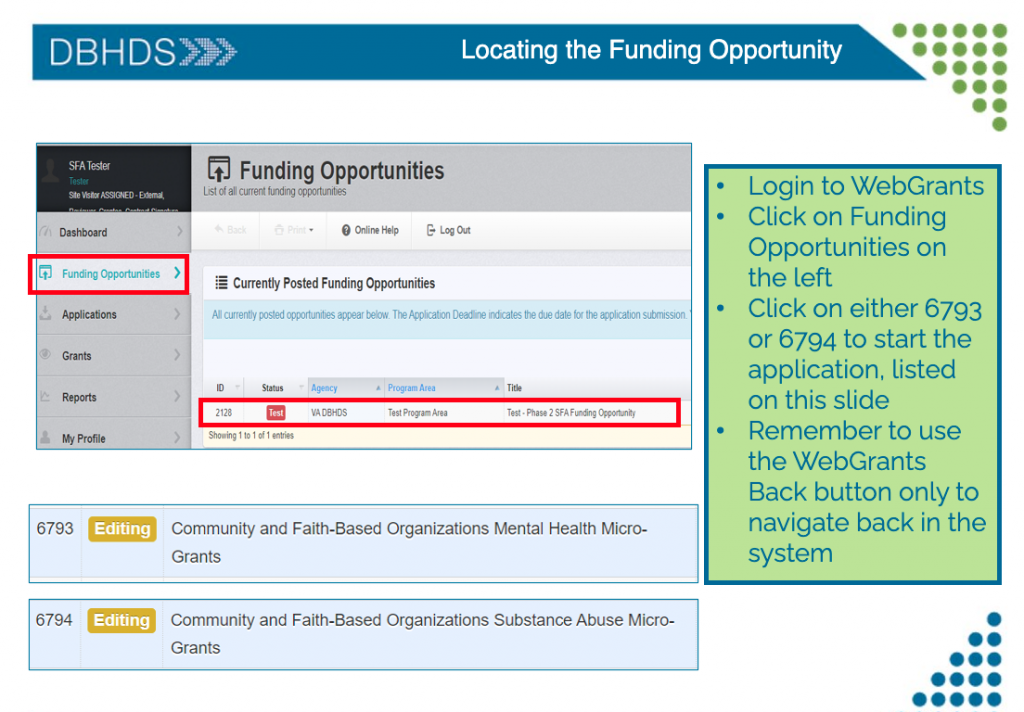NOTE: The initial application period for this program as ended with over 70 applications! If funds permit, we may accept additional applications after February 15th.
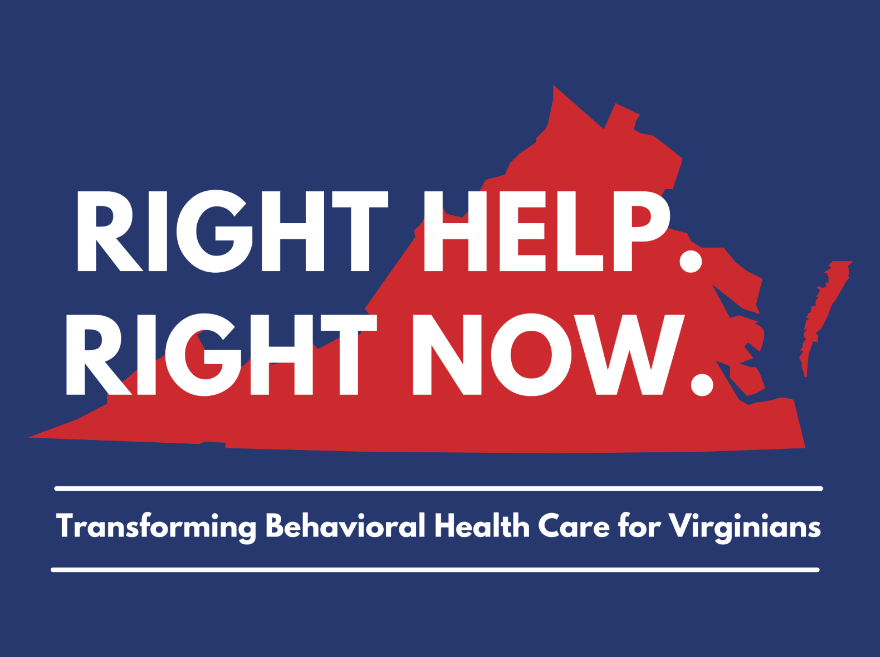
On October 24th, Governor Glenn Youngkin announced at his Faith-Based Leaders Forum on Mental Health that the Commonwealth will be providing applications for micro-grants to community and faith-based organizations to help in Virginia’s fight against the opioid crisis as well as to address the mental health needs of their communities. Therefore, a total of $800,000 has been set aside for faith-based organizations to apply for a grant to provide care for people in their communities who are struggling with substance use and serious mental illness. The grants will be available in amounts up to $15,000.
Navigation Links and Resources:
- Click HERE for information on the application process
- Click HERE to Download the Application Worksheet
- Click HERE for an FAQ of questions from our first webinar
- Click HERE or on the image below to watch the recording of our first webinar
NOTE: The initial application period for this program as ended with over 70 applications! If funds permit, we may accept additional applications after February 15th.
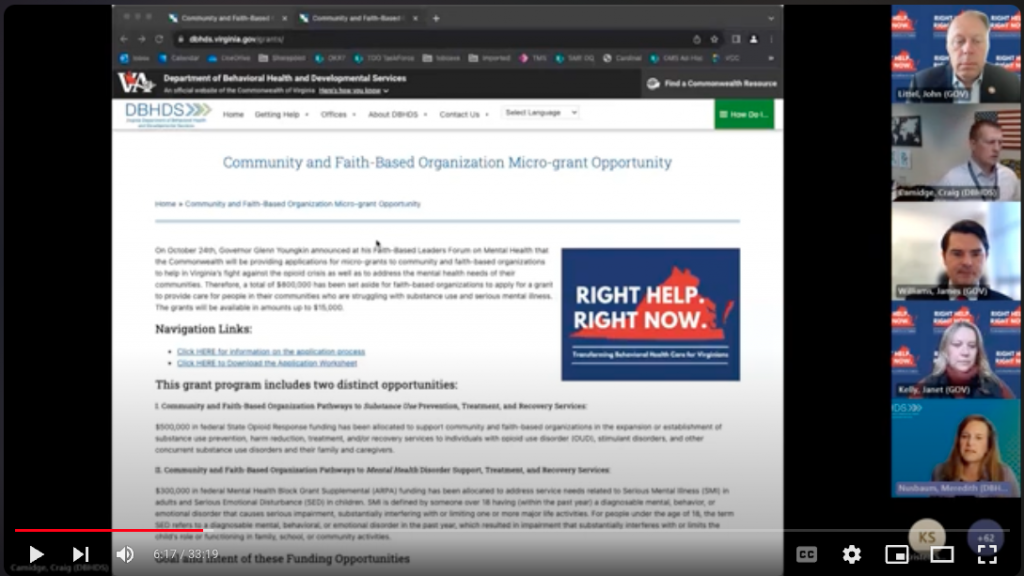
This grant program includes two distinct opportunities:
I. Community and Faith-Based Organization Pathways to Substance Use Prevention, Treatment, and Recovery Services:
$500,000 in federal State Opioid Response funding has been allocated to support community and faith-based organizations in the expansion or establishment of substance use prevention, harm reduction, treatment, and/or recovery services to individuals with opioid use disorder (OUD), stimulant disorders, and other concurrent substance use disorders and their family and caregivers.
II. Community and Faith-Based Organization Pathways to Mental Health Disorder Support, Treatment, and Recovery Services:
$300,000 in federal Mental Health Block Grant Supplemental (ARPA) funding has been allocated to address service needs related to Serious Mental Illness (SMI) in adults and Serious Emotional Disturbance (SED) in children. SMI is defined by someone over 18 having (within the past year) a diagnosable mental, behavior, or emotional disorder that causes serious impairment, substantially interfering with or limiting one or more major life activities. For people under the age of 18, the term SED refers to a diagnosable mental, behavioral, or emotional disorder in the past year, which resulted in impairment that substantially interferes with or limits the child’s role or functioning in family, school, or community activities.
Goal and Intent of these Funding Opportunities
The aim for this funding is to build partnerships between community and faith-based organizations and the behavioral health system, thereby expanding coordination of care, resources, and services that benefit individuals who have substance use and serious mental health conditions.

Governor Youngkin and the Department of Behavioral Health and Developmental Services recognize that community and faith-based organizations often deliver prevention, treatment, and recovery services in these important areas. For the purposes of these micro-grant programs, services are strategies and activities aimed to reduce and/or treat the impact of substance use and serious mental disorders in a way that is individualized and self-directed by the identified individual.
Two types of proposals may be submitted:
(1) Proposals that enhance the existing framework of evidence-based interventions to prevent, reduce, or treat substance use by working to educate and support individuals and communities in the prevention and recovery from the use and misuse of drugs. Activities include, but are not limited to: substance use education and awareness; naloxone training; sponsoring or development of peer run recovery groups; dissemination of harm reduction supplies; supportive individual and group counseling to individuals and their supports; public platforms to raise awareness to the opioid and drug crisis; phone based support services, employment readiness for those in recovery, transportation to treatment for those in recovery, periodic childcare coverage for individuals during treatment services; and linkage and coordination to a higher level of care to include referrals to community services boards, psychiatry, local health agency, residential treatment, and to recovery residences.
(2) Proposals that enhance the existing framework of evidence-based interventions to prevent, reduce, or treat serious mental illness in adults and emotional disturbance in children by working to educate and support individuals and communities in the support, and treatment of those with serious mental illness. Activities include, but not limited to: individual and group supportive counseling including peer-led services, medication management; linkage to community resources, housing, public awareness and community-based trainings (such as Mental Health First Aid, Lock and Talk) as well as the resources needed to host such trainings; linkage to community resources such as social services, food banks, social security, etc.; linkage and coordination to higher level clinical care to include referrals to community services boards, psychiatry, local health department, mental health inpatient treatment, and crisis assessment centers; conferences and trainings enhancing faith-based community programs focus on mental health services.; development of planning groups and/or meetings with faith leaders to build strategic alliances across faith-based and community groups; hosting dialogues between groups of congregations and families around issues of mental health, support, and recovery.
Funding Eligibility
These programs are available to churches, synagogues, mosques, and other faith-based organizations that meet the requirements of Internal Revenue Code (I.R.C) section 501 and 501(c)3.
These programs are one-time competitive grants. Total funding available is $800,000.00. Up to $15,000.00 will be made available to each qualified and successful applicant seeking to provide services.
Application Process
NOTE: The initial application period for this program as ended with over 70 applications! If funds permit, we may accept additional applications after February 15th.
The Governor’s Office and the Department of Behavioral Health and Developmental Services endeavors to make this application process as simple as possible. Recipients of federal funding are, however, required to complete certain processes to be considered eligible.
After you’ve decided your organization will apply for grant funding, complete the steps below:
Application Step 1: Get a Unique Entity Identifier from SAM.gov.
All recipients of federal funding must have a Unique Entity Identifier obtained through SAM.gov. This is not a DBHDS or a Virginia process and is different from an EIN or Tax ID. Importantly, you do NOT need to register your organization to get a UEI. Getting a UEI, if you do not have one already, is a simple and often immediate process. Here is a helpful YouTube video with all the information you might need. Get your UEI at www.SAM.gov.
Application Step 2: Register your organization in WebGrants
After you have your Unique Entity Identifier from SAM.gov, CLICK here to begin registration in WebGrants. To assist you, this Registration Guide has been prepared and contains an email address if you need to reach out for help. DBHDS will approve these registrations as they are received during business hours. Upon approval, you’ll receive email instructions on logging into the WebGrants system.
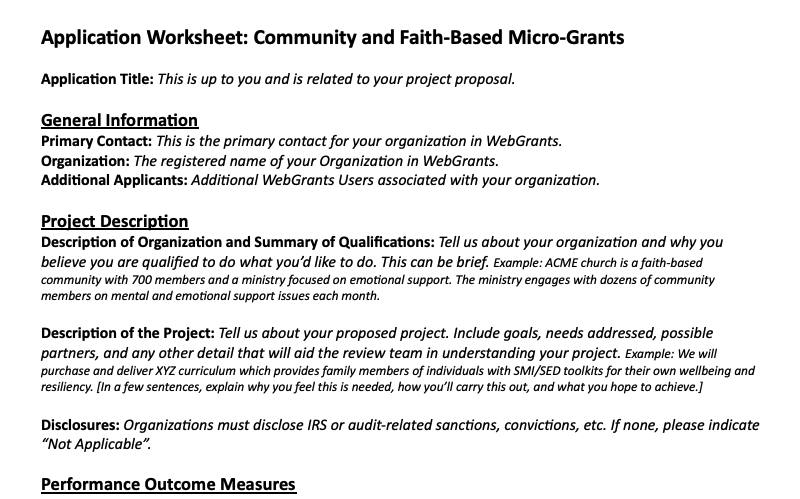
Application Step 3: Gather proposal information to ensure you’re ready to apply
We’ve developed this Application Worksheet to help you prepare the materials required to apply. Please give careful attention to the Project Description, the Desired Outcomes and how they will be measured and reported, and the budget information. We simply cannot approve an award for federal funding until this information is adequate.
Application Step 4: Apply for Micro-Grant in WebGrants
After your registration is approved, log-in to WebGrants with the credentials you received during registration and submit your application. This Application Guide will give you all the help you need to complete this task. Pay particular attention to Slide 2 to ensure you select the correct Micro-Grant Program (MH or SUD)
Application Review
DBHDS will begin reviewing applications as they are received and will award funding based on application eligibility, validation of organizational eligibility, project proposals, and expected outcomes. Preference may be designated for proposals that:
- Foster or enhance new or existing community partnerships with behavioral health organizations
- Develop partnerships between organizations rather than focusing solely on one organization
- Include training and knowledge-building that can benefit communities beyond the grant program period
- Enhance the delivery of services as described above in this page
DBHDS will evaluate proposals as quickly as possible but this process may take up to 30 days.
NOTE: The initial application period for this program as ended with over 70 applications! If funds permit, we may accept additional applications after February 15th.
Further Questions
If you have further questions unrelated to WebGrants, please email communityoperations@dbhds.virginia.gov and we will reply as soon as we are able.
